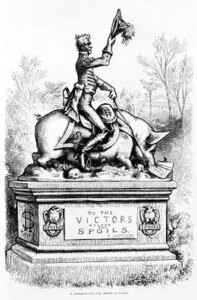The Battle Over Federal Employment: Trump’s Push vs. Union Resistance

In a bold move indicating a significant shift in the federal workforce dynamic, two major unions—the American Federation of Government Employees (AFGE) and the American Federation of State, County and Municipal Employees (AFSCME)—have initiated a lawsuit against President Donald Trump. This legal challenge is focused on his executive order aimed at reclassifying as many as 50,000 federal workers, ostensibly making it easier to fire them. The unions claim that Trump’s directive is a direct attack on a rule instituted by the Biden administration that protects federal employees from losing their job security, fundamentally targeting Trump’s intentions to "drain the swamp" of entrenched bureaucrats.
This showdown reflects a long-standing struggle between presidential authority and the rights of government employees, a theme embedded deeply in American political history.

The Ghost of the Spoils System: A Historical Echo
At the heart of this contemporary conflict lies the historical practice known as the Spoils System, a term that went viral during Andrew Jackson’s presidency in the early 19th century. After Jackson secured the 1828 election—hailing from a period that some argue was rife with election manipulation—he famously rewarded his supporters with government jobs, leading to entrenched nepotism and cronyism. The concept of "to the victor belong the spoils” emerged from Jackson’s political ethos of dismantling the entrenched political order—a sentiment that resonates even today.
This system has become synonymous with governmental dysfunction and inefficiencies, as political loyalty often overshadowed merit-based hiring. Yet, it is crucial to understand that this practice, which Jackson is typically blamed for, actually has roots in the very first administration of George Washington, where patronage was employed to bolster support for the new government.
A Historical Parallel: Reagan and the Air Traffic Controller Strike
Fast forward to 1981, when another seismic shift in federal employment took place under President Ronald Reagan. His decisive action during a strike of air traffic controllers—where almost 13,000 workers walked off the job—established a firm precedent for executive authority over federal employees. Reagan’s subsequent firing of over 11,000 strikers underscored a critical turning point: the government could act aggressively against labor unions if they did not adhere to the laws of the land. Not only did this event reshape labor relations, but it also reinforced the principle that federal employees could be held to account for actions deemed illegal by the sitting president.
Given the history of the Spoils System and Reagan’s strike response, the current legal fight against Trump may extend far beyond this administration, possibly paving the way for future presidents to exert unprecedented control over federal employment practices.
What’s at Stake Now?
The recent lawsuits against Trump represent more than just a battle between federal employees and executive authority. A court ruling in favor of Trump could set a robust legal precedent enabling future presidents to reshape the federal workforce dramatically—simply as a CEO would with a corporate structure. The implications for power dynamics within Washington D.C. are significant, raising questions about the balance of power between the executive branch and federal labor organizations.
At Extreme Investor Network, we emphasize the interconnectedness of economics, policy, and labor relations in influencing market dynamics and investment opportunities. Understanding these historical and political contexts is crucial for investors who need to navigate the potential impacts of policy changes on the broader economy.
As the situation unfolds, it will be fascinating to observe how the legal proceedings and political maneuvers influence not just labor relations, but the shaping of economic policy and governance in the United States. Will we see a resurgence of the Spoils System, or can we expect a shift toward more meritocratic hiring practices? Only time will tell.
Stay tuned for updates on this evolving narrative as we continue to analyze the implications of political actions on our economy and investment strategies.

